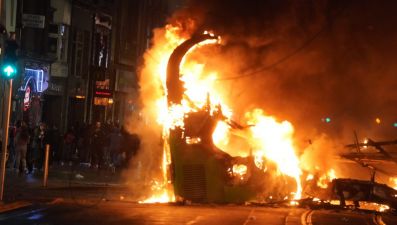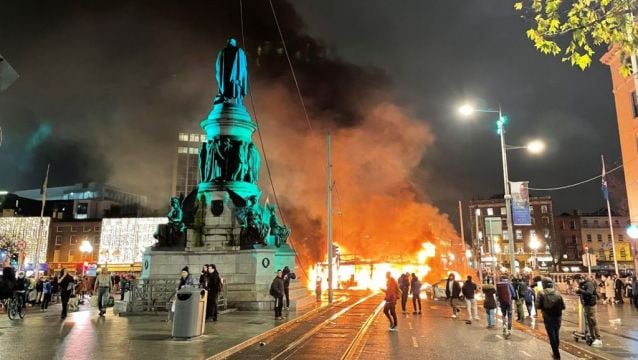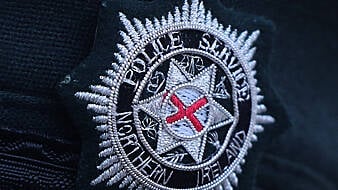The editor of a photo news company has said An Garda Síochána's attempts to compel him to hand over pictures from the Dublin riots will put the safety of photojournalists at risk.
Rollingnews.ie editor Eamonn Farrell told BreakingNews.ie that the Garda action would put "unnecessary danger" on him and his colleagues.
He expects gardaí to go to court for a warrant on Monday or Tuesday this week following his refusal.
Mr Farrell said the far-right groupings that took part in the Dublin riots are more violent and abusive than any group he has experienced over the course of his career.
"I've been recording protests going back to before the hunger strikes and the H-Bloc riots. I've covered protests of all kinds; far left, anarchists, republicans, you name it.
"I've never come across the amount of abuse and intimidation that is occurring at the moment in relation to far-right groups. If the people I'm videoing or photographing want to do the same to me, I've no problem with that... what I do object to is the level of abuse, intimidation and threats involved when they are doing that.
"Sometimes you end up being surrounded by three or four people videoing you at the same time. While they're doing that, they are abusing you and threatening you at the same time. We have to live with that, and we will continue to live with that and do our jobs.
"What I'm concerned about is the enhanced level of threat that we will face if it becomes known that generally the pictures we take are then made available to gardaí."
Violence and threats
He said photojournalists would be seen as "the eyes and ears of the State" and more likely to face violence and threats if they are compelled to share their photographs with gardaí.
Referring to certain groups that were involved in the Dublin riots, and at anti-immigration protests he has documented, Mr Farrell said: "They don't actually want the media covering their events because, as far as they're concerned, the media is all fake news. Because they're able to use new technology very effectively and produce their content online for their own followers, they're involved in an ongoing circle of information.
"The last thing they want their followers to do is read what the media is putting out online or in print because they might see a different point of view, so the last thing they want to see while carrying out a protest is to see a reporter or photographer coming along, not trying to attack their views, but recording them and putting them out there to be discussed."
Mr Farrell described being intimidated by anti-immigration protesters last year as he documented a demonstration in Mullingar, Co Westmeath.
The level of danger we may be in is possibly going to be enhanced by gardaí continuing on insisting we provide them with the visual information we have recorded.
"I was down in Mullingar last year when there were people being housed in a building there. I was the only journalist there, and I was told the wheels of my jeep would be missing when I went to leave. If they found out where my house was, I was going to be burnt out, I was surrounded by a gaggle of them shouting, screaming and videoing me.
"What I am concerned about is the level to which this kind of thing is increasing and getting worse.
"The level of danger we may be in is possibly going to be enhanced by gardaí continuing on insisting we provide them with the visual information we have recorded."
Mr Farrell reiterated his warning that a photojournalist could be seriously injured if anger against them is escalated by supplying pictures to gardaí.
He said he fears not being able to send colleagues out to cover events anymore due to concerns about their safety.

"I think that's a real possibility... because the level of intimidation and abuse is growing all the time. Most people saw the video recording of a lone Garda being attacked during the Dublin riots, like a lion being attacked by a group of hyenas. There was no fear in the attackers. If they feel free to do that to a Garda, what fear would they have in doing it to a photographer with his or her back turned to them?
"We're prepared to deal with this level of threat, but we're not prepared for it being enhanced with gardaí turning us into their eyes and ears. What will the next step be: us being asked to livestream it to Garda HQ? We can't be a substitute because gardaí don't have body cams.
"As far as I'm concerned, it's a very serious situation, and an unnecessary level of extra threat being put on us simply trying to do our job and be the eyes and ears of the people who read their newspapers, listen to the radio, and watch the news on TV.
"We've always been careful. No matter what our personal views are in relation to abortion, housing, a whole range of issues, we cover them because that's our job, and we want to continue doing it."







